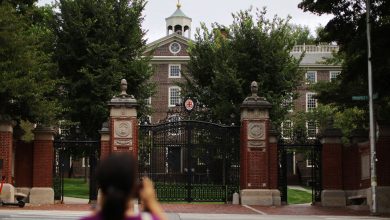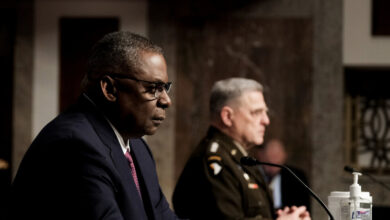State Dept. Says Moscow’s Ukraine Diplomacy Was a ‘Pretense’

WASHINGTON — The Biden administration said on Friday that Russia was never serious about finding a diplomatic solution to the crisis over Ukraine, and that weeks of back-and-forth between Washington and Moscow amounted to a sham as the Kremlin prepared for war.
“Moscow engaged in the pretense of diplomacy,” the State Department spokesman, Ned Price, told reporters at a daily news conference. “It now appears quite clear that Russia was not, and has not been, interested in genuine diplomacy.”
Mr. Price’s words were the most definitive statement yet by the Biden administration that President Vladimir V. Putin of Russia had not dealt in good faith, even as Russian diplomats repeatedly met face to face with their American and European counterparts. Washington and Moscow also exchanged multiple rounds of formal documents on European security.
The assessment was a departure from assertions made by U.S. officials in recent months that, despite the Russian forces amassing along Ukraine’s border, Mr. Putin remained undecided on whether to order an invasion.
Mr. Price did not specify whether the Biden administration believes that Russia’s diplomats themselves knew that their efforts were for show.
As the threat of invasion grew more apparent this year, Biden officials met with Russian emissaries across Europe to test Moscow’s intentions, warning all along that they were unsure whether Russia was earnestly seeking a diplomatic solution.
In mid-January, the deputy secretary of state, Wendy R. Sherman, visited Switzerland, Belgium and Austria to meet with Russians and Europeans in varying configurations. At one session, she appealed to her Russian counterparts by recalling how her father had been a Marine in World War II, when America and Russia shared a common enemy in Nazi Germany. In late January, Secretary of State Antony J. Blinken met with Russia’s foreign minister, Sergey V. Lavrov, in Geneva. Days later, the U.S. ambassador in Moscow, John J. Sullivan, delivered a document to the Russian foreign ministry outlining broad U.S. negotiating principles in response to earlier Russian demands.
On Friday, Mr. Price declared that those interactions had amounted to a charade. The Russians, he said, used the illusion of diplomacy “to buy time to continue their preparations for what it seems clear that Vladimir Putin had intended all along.”
While conservative critics have said that Mr. Blinken and others put too much effort into futile diplomacy with an untrustworthy Russian leader, Mr. Price’s assertion also served as an implicit response to some analysts who say the United States might have done more to avoid war.
In particular, some have said that explicit assurances from the United States that Ukraine would not become a member of NATO might have been enough to satisfy Mr. Putin.
In the run-up to his attack, the Russian leader repeatedly said the prospect of Ukrainian membership in NATO was an unacceptable threat to his country, although he also issued other, far more sweeping demands about the alliance’s posture in Europe that Western officials called non-starters. The United States and Europe offered Mr. Putin little in return for his implied threat — he publicly denied any intention to invade Ukraine — proposing talks on relatively narrow subjects like arms control and military exercises in Europe.
Samuel Charap, a former State Department official who is now a Russia analyst at the RAND Corporation, said it seemed at least possible that assurances about Ukraine’s future NATO membership might have been enough to defang Mr. Putin.
“Was there a deal to be had? It’s unclear to me whether we fully tested that proposition down to the core issue,” he said, adding that the blame for the invasion falls entirely on Mr. Putin.
As war seemed to grow nearer, several European and at least one Ukrainian official appeared to float the possibility that Kyiv would forswear its NATO ambitions.
President Biden noted in public remarks last month that the widely accepted truth was that Ukraine was “not very likely” to join NATO anytime soon. France’s president, Emmanuel Macron, said that the Cold War neutrality model known as “Finlandization” was an idea “on the table.” And Ukraine’s ambassador to Britain, Vadym Prystaiko, told the BBC that his country could be “flexible” about NATO membership (although he quickly backtracked).
But such talk was never presented to Russia as a formal diplomatic offer.
Charles A. Kupchan, who was Europe director of the National Security Council in the Obama White House, said Mr. Putin’s muted response to such talk suggested that more explicit proposals to keep Ukraine out of NATO would have been futile.
“Was the body language coming out of Washington, Kyiv and every European capital enough to provide some trade space if he wanted it? Yes. But he did not seem to pick it up,” Mr. Kupchan said.
“I think going back to the early 1990s, the American foreign policy establishment has too easily dismissed Russian objections to NATO enlargement,” he added. “That having been said, when I step back from the events of the last couple of months, the prospect of Ukraine joining NATO looks more like a smoke screen to me than the nub of the issue” for Mr. Putin.
Understand Russia’s Attack on Ukraine
What is at the root of this invasion? Russia considers Ukraine within its natural sphere of influence, and it has grown unnerved at Ukraine’s closeness with the West and the prospect that the country might join NATO or the European Union. While Ukraine is part of neither, it receives financial and military aid from the United States and Europe.
Are these tensions just starting now? Antagonism between the two nations has been simmering since 2014, when the Russian military crossed into Ukrainian territory, after an uprising in Ukraine replaced their Russia-friendly president with a pro-Western government. Then, Russia annexed Crimea and inspired a separatist movement in the east. A cease-fire was negotiated in 2015, but fighting has continued.
How did this invasion unfold? After amassing a military presence near the Ukrainian border for months, on Feb. 21, President Vladimir V. Putin of Russia signed decrees recognizing two pro-Russian breakaway regions in eastern Ukraine. On Feb. 23, he declared the start of a “special military operation” in Ukraine. Several attacks on cities around the country have since unfolded.
What has Mr. Putin said about the attacks? Mr. Putin said he was acting after receiving a plea for assistance from the leaders of the Russian-backed separatist territories of Donetsk and Luhansk, citing the false accusation that Ukrainian forces had been carrying out ethnic cleansing there and arguing that the very idea of Ukrainian statehood was a fiction.
How has Ukraine responded? On Feb. 23, Ukraine declared a 30-day state of emergency as cyberattacks knocked out government institutions. Following the beginning of the attacks, Volodymyr Zelensky, Ukraine’s president, declared martial law. The foreign minister called the attacks “a full-scale invasion” and called on the world to “stop Putin.”
How has the rest of the world reacted? The United States, the European Union and others have condemned Russia’s aggression and begun issuing economic sanctions against Russia. Germany announced on Feb. 23 that it would halt certification of a gas pipeline linking it with Russia. China refused to call the attack an “invasion,” but did call for dialogue.
How could this affect the economy? Russia controls vast global resources — natural gas, oil, wheat, palladium and nickel in particular — so the conflict could have far-reaching consequences, prompting spikes in energy and food prices and spooking investors. Global banks are also bracing for the effects of sanctions.
Andrew S. Weiss, the head of the Russia and Eurasia program at the Carnegie Endowment for International Peace, said that Russia had made impossible demands from the start, but that the illusion of diplomacy set off a political debate in the West that served Mr. Putin’s purposes. Moscow, he said, focused “rather cleverly on age-old complaints about Ukraine’s theoretical eligibility for NATO membership, knowing full well that this issue triggers a lot of people in the West.”
The United States engaged in a “stale and predictable academic debate with ourselves about whether past administrations’ policies were needlessly provocative toward the Kremlin,” Mr. Weiss said. That discussion, he added, played into the hands of “isolationists like former President Trump who maintain that U.S. alliances are a needless burden and the Americans would be better off defending the border with Mexico.”
“In Europe, where anti-Americanism and Ukraine fatigue are just below the surface, the Kremlin’s Potemkin diplomacy gambit also paid off,” Mr. Weiss said.
Kori Schake, the director of foreign and defense policy studies at the American Enterprise Institute, said it was hard to know whether Mr. Putin ever took diplomacy seriously. But she said he might have expected the extreme pressure of an invasion to fracture the West and win him some concessions. “Having underestimated Western unity, he may have felt trapped and couldn’t retreat with nothing to show for it,” she said.
Ms. Schake said it was also possible that Mr. Putin was rattled by the quality of the Biden administration’s intelligence, which included access to his war plans, “and in a rage pulled the trigger.”
Whatever the case, U.S. officials now see Mr. Putin’s diplomatic overtures with the most jaded of eyes.
The U.S. added Mr. Lavrov, the foreign minister, to its list of sanctioned Russians on Friday. And Mr. Price was wholly dismissive of an offer that day from the Kremlin to meet Ukrainian officials in Belarus for negotiations. He said that Moscow was “suggesting that diplomacy take place at the barrel of a gun.”
Declaring that Russia’s invasion has “fundamentally changed” its relationship with the rest of the world, Mr. Price added that the Biden administration had no plans to continue the arms control talks with Russia it began last year, and which U.S. officials had offered to invigorate in recent weeks. He said that some crucial subjects would still warrant diplomatic contacts with Moscow, citing as an example the talks to restore the 2015 nuclear agreement with Iran.
As Russian forces closed in on Kyiv this week, the issue of Ukraine’s neutrality was raised once again — this time by the country’s president, Volodymyr Zelensky, in a televised address. Looking depleted and wearing a simple T-shirt, Mr. Zelensky rallied his fellow Ukrainians against the Russian attack.
But he also had an offer for Mr. Putin, hinting that his country might at last drop its ambitions to join NATO.
“We are not afraid to talk about neutral status,” Mr. Zelensky said.
Mr. Putin had no reply.





